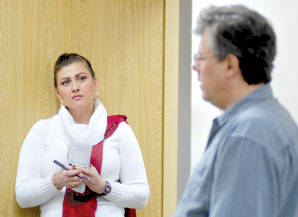When veterans come home from war, an entirely new challenge begins. Depression can take hold, along with any number of other post-traumatic inflictions. In any case, they face a difficult readjustment process.
Jeffrey Heider has been working with veterans in the Flathead Valley for 27 years. He knows how hard it can be. And that’s why he’s so pleased to see the opening of the Kalispell Vet Center, which provides readjustment counseling to veterans of combat. Heider, a psychologist, is the center’s team leader.
“We have a motto: keeping the promise,” Heider said. “The promise being, you served us, now we serve you.”
Congress established the Vet Center Program in 1979 in response to the large number of Vietnam veterans enduring difficulties transitioning back into civilian life. Over the years, Heider said 200 vet centers emerged across the country, including ones in Missoula and Billings in the early 1980s.
Due to increased awareness of the readjustment problems experienced by veterans of the wars in Iraq and Afghanistan, Heider said 60 more centers are opening nationwide. The Kalispell facility began seeing patients on Nov. 8 and another center opened its doors in Great Falls last week, bringing Montana’s total to four.
 |
|
Ronda Kirby, left, listens as Dr. Jeffrey Heider explains the need for veteran counseling at the new Kalispell Vet Center off Meridian Road. Kirby, the center’s office manager, served with the 101st Airborne during the Iraq invasion and is a 14-year veteran of the U.S. Army and U.S. Army Reserve. |
Montana has more than 100,000 veterans, one of the highest per capita populations in the nation. There are 40,000 combat veterans in western Montana alone.
“One of the big things is to reach out to the younger veterans,” Heider said.
Combat veterans come to Heider with troubles fitting in, anger, impatience, nightmares and any number of problems associated with readjustment. Some develop Post Traumatic Stress Disorder. Heider also sees a lot of “hyper vigilance – being extra watchful.” This is common with veterans of both the Vietnam War and the war on terrorism, though it manifests itself differently.
“Vietnam vets – a lot of them watch tree lines and watch the ground for trip wires,” Heider said. “Iraqi vets – they’re scared of overpasses; they watch the side of the road and tall buildings.”
He added: “A lot of our Iraqi vets have a hard time driving through downtown Kalispell.”
Ronda Kirby, the Kalispell Vet Center’s office manager, is a 14-year veteran of the United States Army and Army Reserve. She served with the 101st Airborne during the Iraqi invasion in 2003. Kirby said readjustment troubles are far-ranging and varied.
“I think it’s different for each and every person, for each and every war,” she said.
Accordingly, the Kalispell Vet Center provides a wide breadth of counseling services. In addition to Heider’s treatment of veterans of many different ages and backgrounds on an individual basis, he conducts group sessions as well.
Paul Hanna, a 19-year veteran of the U.S. Navy, does marriage and family counseling. The center is also recruiting another therapist. Heider said Hanna would like to focus on bereavement and family support services.
“That’s a big concern – the impact on the young families left behind,” Heider said.
Survivors of sexual trauma are another focus. In a war situation where female and male soldiers intermingle, Kirby said “you get a lot of opportunities for something like that,” and incidents often aren’t reported up the chain of command. Heider said both females and males experience sexual trauma.
“We’re trying to develop a particular sensitivity to it,” Heider said, “especially since we have more females serving.”
The 2,800-square-foot facility on North Meridian Street is still awaiting furniture in many rooms. But in the meantime, the building has been busy with frequent patients. Heider said 113 veterans are registered, though only about 60 are currently receiving therapy. He brought many over from his private work.
Heider said the facility is designed to be approachable and comfortable. A computer will be set up with free Internet. Veterans can show up to make copies, send faxes or use the phone.
Combat veterans seeking counseling needn’t be registered with the Department of Veterans Affairs, Heider said. Counseling is free and files are kept confidential.
“One of the big things,” Heider said, “is making a veteran feel safe again and that can be a long process.”
The Kalispell Vet Center is located at 690 N. Meridian, Suite 101. It can be reached at (406) 257-7312.